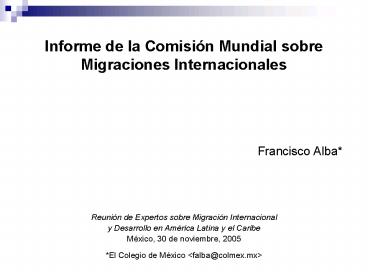Diapositiva 1 - PowerPoint PPT Presentation
1 / 13
Title: Diapositiva 1
1
Informe de la Comisión Mundial sobre Migraciones
Internacionales Francisco Alba Reunión
de Expertos sobre Migración Internacional y
Desarrollo en América Latina y el Caribe México,
30 de noviembre, 2005 El Colegio de México
ltfalba_at_colmex.mxgt
2
A world of work Migrants in a globalizing labour
market
Principle Migrating out of choice Migration
and the global economy
Women, men and children should be able to realize
their potential, meet their needs, exercise their
human rights and fulfil their aspirations in
their country of origin, and hence migrate out of
choice, rather than necessity. Those women and
men who migrate and enter the global labour
market should be able to do so in a safe and
authorized manner, and because they and their
skills are valued and needed by the states and
societies that receive them.
3
(No Transcript)
4
The challenge of irregular migration State
sovereignty and human security
Principle Addressing irregular migration
States, exercising their sovereign right to
determine who enters and remains on their
territory, should fulfil their responsibility and
obligation to protect the rights of migrants and
to re-admit those citizens who wish or who are
obliged to return to their country of origin. In
stemming irregular migration, states should
actively cooperate with one another, ensuring
that their efforts do not jeopardize human
rights, including the right of refugees to seek
asylum. Governments should consult with
employers, trade unions and civil society on this
issue.
5
(No Transcript)
6
Diversity and cohesion Migrants in society
Principle Strengthening social cohesion through
integration
Migrants and citizens of destination countries
should respect their legal obligations and
benefit from a mutual process of adaptation and
integration that accommodates cultural diversity
and fosters social cohesion. The integration
process should be actively supported by local and
national authorities, employers and members of
civil society, and should be based on a
commitment to non-discrimination and gender
equity. It should also be informed by an
objective public, political and media discourse
on international migration.
7
(No Transcript)
8
Migration and development Realizing the
potential of human mobility
Principle Reinforcing economic and
developmental impact
The role that migrants play in promoting
development and poverty reduction in countries of
origin, as well as the contribution they make
towards the prosperity of destination countries,
should be recognized and reinforced.
International migration should become an integral
part of national, regional and global strategies
for economic growth, in both the developing and
developed world.
9
(No Transcript)
10
A principled approach Laws, norms and human
rights
Principle Protecting the rights of migrants
The legal and normative framework affecting
international migrants should be strengthened,
implemented more effectively and applied in a
non-discriminatory manner, so as to protect the
human rights and labour standards that should be
enjoyed by all migrant women and men. Respecting
the provisions of this legal and normative
framework, states and other stakeholders must
address migration issues in a more consistent and
coherent manner.
11
(No Transcript)
12
Creating coherence The governance of
international migration
Principle Enhancing governance Coherence,
capacity and cooperation
The governance of international migration should
be enhanced by improved coherence and
strengthened capacity at the national level
greater consultation and cooperation between
states at the regional level, and more effective
dialogue and cooperation among governments and
between international organizations at the global
level. Such efforts must be based on a better
appreciation of the close linkages that exist
between international migration and development
and other key policy issues, including trade,
aid, state security, human security and human
rights.
13
- www.gcim.org































